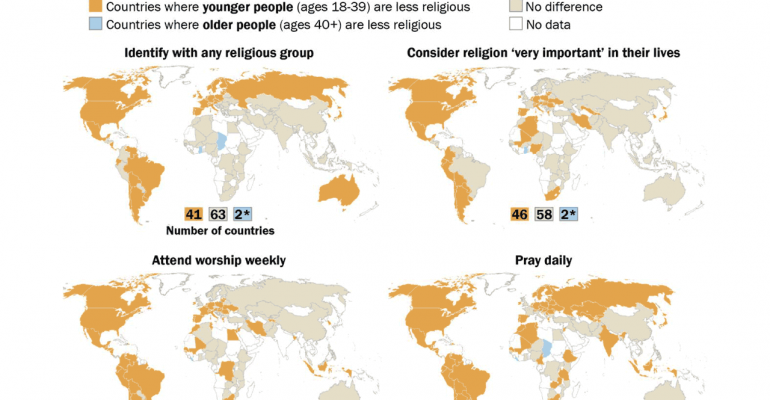The age gap in religion around the world
June 13, 2018 2024-03-18 16:06The age gap in religion around the world

The age gap in religion around the world
By several measures, young adults tend to be less religious than their elders; the opposite is rarely true.
In the United States, religious congregations have been graying for decades, and young adults are now much less religious than their elders. Recent surveys have found that younger adults are far less likely than older generations to identify with a religion, believe in God or engage in a variety of religious practices.
But this is not solely an American phenomenon: Lower religious observance among younger adults is common around the world, according to a new analysis of Pew Research Center surveys conducted in more than 100 countries and territories over the last decade.
Although the age gap in religious commitment is larger in some nations than in others, it occurs in many different economic and social contexts – in developing countries as well as advanced industrial economies, in Muslim-majority nations as well as predominantly Christian states, and in societies that are, overall, highly religious as well as those that are comparatively secular.
For example, adults younger than 40 are less likely than older adults to say religion is “very important” in their lives not only in wealthy and relatively secular countries such as Canada, Japan and Switzerland, but also in countries that are less affluent and more religious, such as Iran, Poland and Nigeria.
While this pattern is widespread, it is not universal. In many countries, there is no statistically significant difference in levels of religious observance between younger and older adults. In the places where there is a difference, however, it is almost always in the direction of younger adults being less religious than their elders… In 41 countries, adults under 40 are significantly less likely than their elders to have a religious affiliation, while in only two countries (Chad and Ghana) are younger adults more likely to identify with a religious group. In 63 countries, there is no statistically significant difference in affiliation rates.
Source: Pew Research Center








